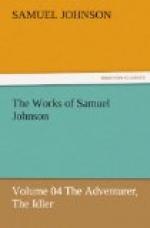The duke of Mantua, having received so many proofs of his various merit, made him tutor to his son Vicentio di Gonzaga, a prince of loose manners and turbulent disposition. On this occasion it was, that he composed the comedy in which he exhibited so many different characters with exact propriety. But his honour was of short continuance; for as he was one night in the time of Carnival rambling about the streets, with his guitar in his hand, he was attacked by six men masked. Neither his courage nor skill in his exigence deserted him: he opposed them with such activity and spirit, that he soon dispersed them, and disarmed their leader, who throwing off his mask, discovered himself to be the prince his pupil. Crichton, falling on his knees, took his own sword by the point, and presented it to the prince; who immediately seized it, and instigated, as some say, by jealousy, according to others, only by drunken fury and brutal resentment, thrust him through the heart.
Thus was the Admirable Crichton brought into that state, in which he could excel the meanest of mankind only by a few empty honours paid to his memory: the court of Mantua testified their esteem by a publick mourning, the contemporary wits were profuse of their encomiums, and the palaces of Italy were adorned with pictures, representing him on horseback with a lance in one hand and a book in the other[1].
[1] This paper is enumerated by Chalmers among those
which Johnson
dictated, not to Bathurst,
but to Hawkesworth. It is an elegant
summary of Crichton’s
life which is in Mackenzie’s Writers of the
Scotch Nation. See a
fuller account by the Earl of Buchan and Dr.
Kippis in the Biog. Brit.
and the recently published one by Mr.
Frazer Tytler.
No. 84. SATURDAY, AUGUST 25, 1753.
Tolle periclum,
Jam vaga prosiliet frenis natura remotis.
HOR. Lib. ii. Sat. vii. 73.
But take the danger and the shame away,
And vagrant nature bounds upon her prey.
FRANCIS.
TO THE ADVENTURER.
SIR,
It has been observed, I think, by Sir William Temple, and after him by almost every other writer, that England affords a greater variety of characters than the rest of the world. This is ascribed to the liberty prevailing amongst us, which gives every man the privilege of being wise or foolish his own way, and preserves him from the necessity of hypocrisy or the servility of imitation.
That the position itself is true, I am not completely satisfied. To be nearly acquainted with the people of different countries can happen to very few; and in life, as in every thing else beheld at a distance, there appears an even uniformity: the petty discriminations which diversify the natural character, are not discoverable but by a close inspection; we, therefore, find them most at home, because there we have most opportunities of remarking them. Much less am I convinced, that




